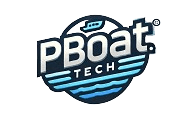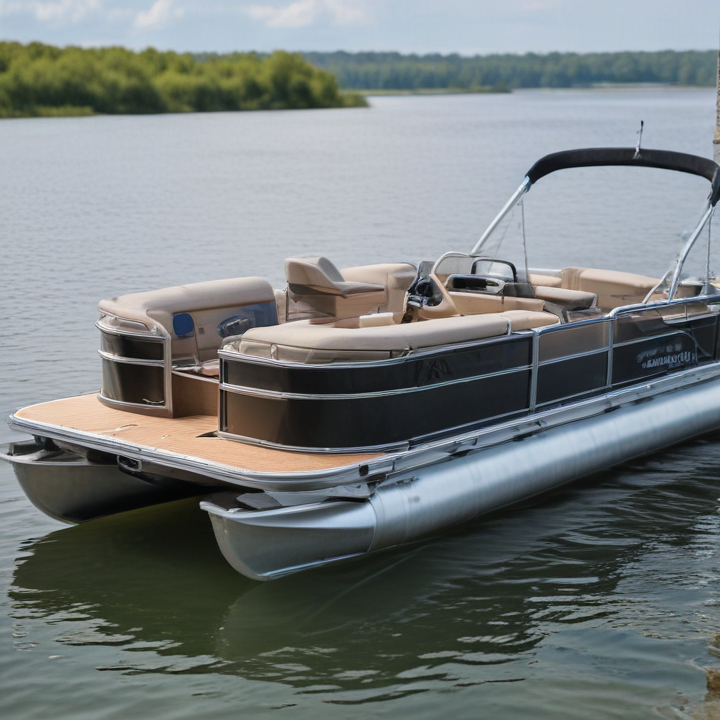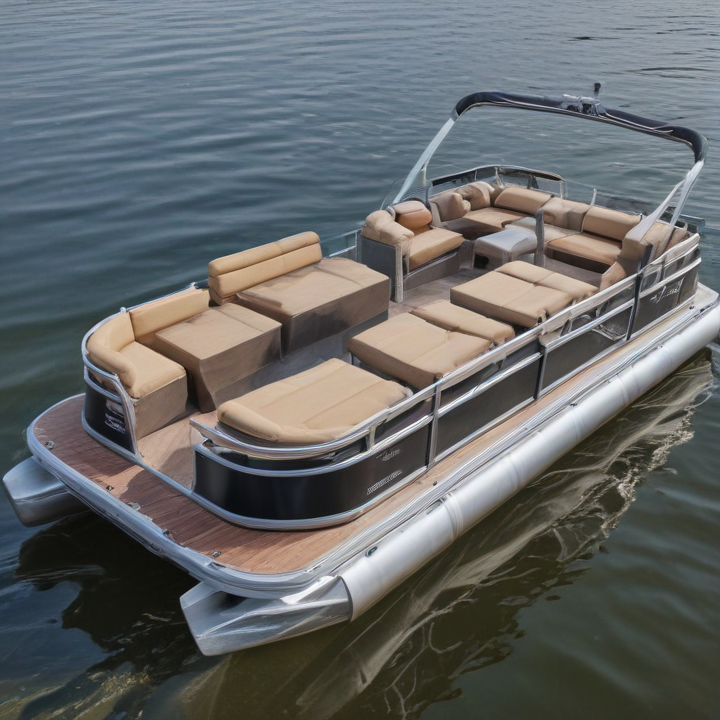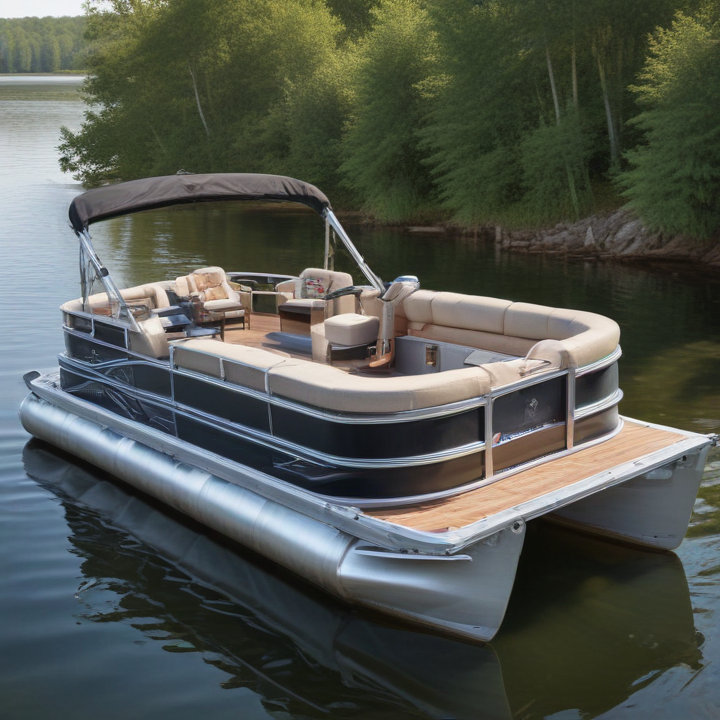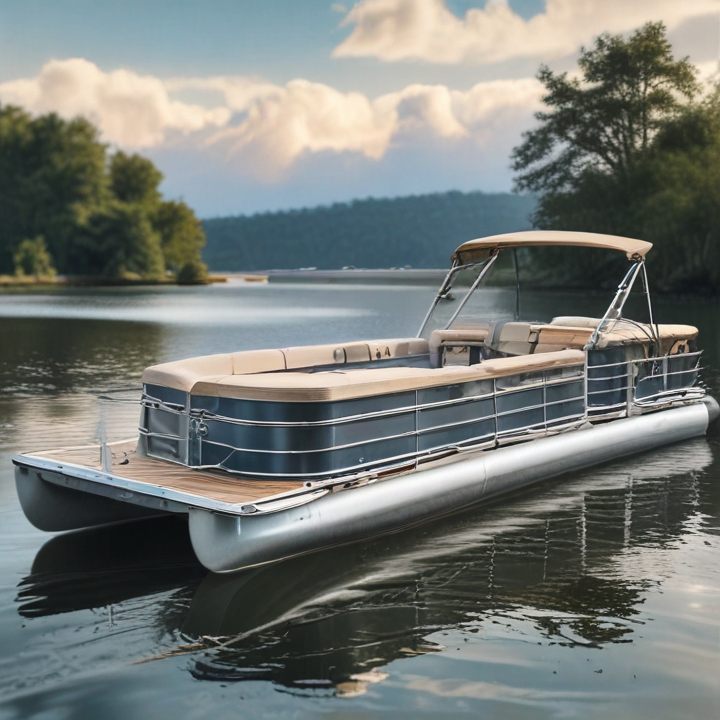pontoon boats for sale Safety Certifications
When purchasing a pontoon boat, prioritizing safety is crucial. Let’s delve into the essential safety certifications and considerations you should look for:
1. NMMA Certification:
– The National Marine Manufacturers Association (NMMA) certification ensures the boat adheres to high-quality standards.
– NMMA-certified boats meet or exceed the standards set by the American Boat & Yacht Council (ABYC) and are equipped with necessary safety features and construction protocols.
2. USCG Compliance:
– Ensure the pontoon boat complies with U.S. Coast Guard (USCG) regulations.
– Look for a USCG capacity plate, which indicates maximum weight capacity and number of passengers to avoid overloading.
3. ABYC Standards:
– Boats built to ABYC standards offer reliability in electrical systems, fuel systems, navigation lights, and other crucial areas.
– Verify the pontoon boat has been tested and meets these standards.
4. HIN Verification:
– Check the Hull Identification Number (HIN) for authenticity. This unique 12-character ID identifies the boat and confirms it meets safety standards.
5. Safety Equipment:
– Stock the boat with essential safety equipment: life jackets, fire extinguishers, sound-producing devices, visual distress signals, and a first aid kit.
– Ensure the pontoon boat has accessible storage for safety gear and emergency supplies.
6. Regular Inspections:
– Opt for a boat that includes a recent safety inspection report.
– Periodic inspections and maintenance ensure compliance with safety standards and reliable operation.
By ensuring these certifications and adhering to safety guidelines, you enhance the safety and enjoyment of your pontoon boating experience. Always discuss these factors with the seller and verify the documentation to make an informed purchase.
List Reference Technical Parameters of “pontoon boats for sale”
When considering the purchase of a pontoon boat, various technical parameters come into play to guide your decision. Here are the key reference technical parameters to consider:
1. Size and Dimensions:
– Length: Typically ranges from 16 to 30 feet.
– Width: Generally between 8 to 10 feet.
– Deck Area: Measured in square feet, affecting passenger and equipment capacity.
2. Hull and Construction:
– Material: Most hulls are made of aluminum for durability and performance.
– Tubes/Pontoons: Diameter size affects buoyancy and stability, usually between 23 to 30 inches.
3. Weight and Capacity:
– Dry Weight: Important for towing, commonly between 1,500 to 3,500 lbs.
– Passenger Capacity: Ranges from 8 to 18 people, based on boat size and configuration.
– Weight Capacity: Typically from 1,500 to 4,000 lbs, including passengers and gear.
4. Engine and Performance:
– Engine Type: Can be outboard or inboard, but outboard engines are more common.
– Horsepower: Varies widely; common ranges are from 25 to 300 HP depending on intended use.
– Fuel Capacity: Usually between 20 to 80 gallons.
5. Performance and Handling:
– Speed: Depends on engine power and boat size, generally between 15 to 50 mph.
– Handling Features: Includes steering systems, ease of maneuverability, and stability.
6. Deck and Seating Arrangements:
– Layout: Various configurations, such as lounges, fishing stations, and sunpads.
– Seating: Materials and comfort level vary; often features marine-grade vinyl.
7. Additional Features:
– Electronics: Navigation systems, fishfinders, and audio systems.
– Storage: Under-seat storage, built-in coolers, and compartments.
– Safety Equipment: Includes life jackets, fire extinguishers, and navigational lights.
Understanding these technical parameters helps in selecting the pontoon boat that best fits your needs, ensuring an enjoyable and safe boating experience.
List Product features of “pontoon boats for sale”
Certainly! Here are some key product features of pontoon boats for sale:
1. Spacious Deck:
– Offers ample space for seating, sunbathing, and activities.
– Ideal for families and groups, with seating capacity often ranging from 6 to 15 people.
2. Comfortable Seating:
– Comes with cushioned, ergonomic seats for enhanced comfort.
– Options for lounge-style seating, swivel chairs, and adjustable captain’s chairs.
3. Entertainment Options:
– Often equipped with premium sound systems including marine-grade speakers.
– Some models include built-in coolers, tables, and BBQ grills for on-water dining.
4. Performance:
– Powered by outboard or inboard engines, with varying horsepower to meet different speed requirements.
– Advanced models might include performance packages for better handling and speed.
5. Durability:
– Constructed with high-quality aluminum pontoons for longevity and stability.
– Marine-grade upholstery and flooring resistant to mildew, stains, and UV damage.
6. Safety Features:
– Includes navigation lights, life jacket storage, and non-slip flooring.
– High railings and gated entry points for added safety, especially for children and pets.
7. Ease of Use:
– User-friendly dashboard with navigational tools, speedometer, and easy-to-read gauges.
– Some models offer joystick controls and touchscreen interfaces for advanced maneuverability.
8. Customization:
– Wide array of customizable options including color schemes, seating arrangements, and additional features like fishing stations.
– Available upgrades like Bimini tops, mooring covers, and additional storage spaces.
9. Versatility:
– Suitable for various activities like fishing, waterskiing, swimming, and leisurely cruising.
– Some models are specifically designed for fishing with features like rod holders, fish finders, and bait wells.
10. Eco-Friendly Options:
– Availability of environmentally-friendly engines with lower emissions.
– Optional hybrid or electric propulsion systems for a greener boating experience.
These features make pontoon boats a versatile, comfortable, and safe choice for various water-based activities.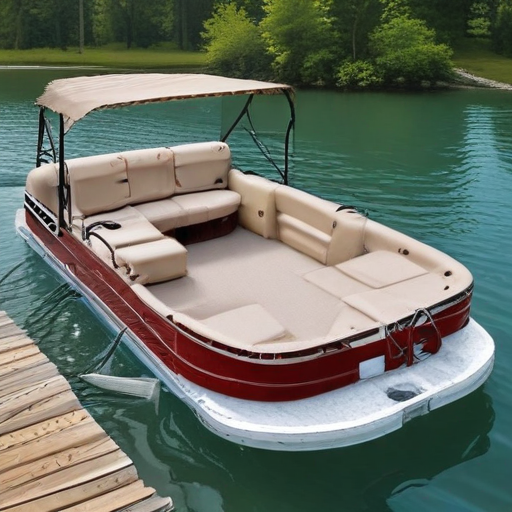
List Application of “pontoon boats for sale”
Pontoon boats are versatile and can cater to a wide variety of activities, making them a popular choice among boating enthusiasts. Here are some common applications for “pontoon boats for sale”:
1. Leisure and Cruising: Pontoon boats offer a stable and comfortable platform ideal for leisurely cruises on lakes or calm coastal waters. Their spacious decks and seating arrangements make them perfect for relaxing and enjoying a day on the water.
2. Fishing: Many pontoon boats are designed with fishing in mind, featuring rod holders, livewells, and ample deck space for casting. The stability of pontoon boats makes them well-suited for both novice and experienced anglers.
3. Water Sports: With powerful engines and sturdy structures, pontoon boats can tow water skiers, wakeboarders, and inflatable tubes. Some models come equipped with swim platforms and ladders for easy access to and from the water.
4. Family Outings: The generous seating capacity and safety features make pontoon boats an excellent choice for family outings. They provide plenty of room for passengers of all ages to move around comfortably.
5. Entertaining: The flat, spacious deck of a pontoon boat is perfect for hosting social gatherings. Some models come with built-in bars, grills, and sound systems to enhance the party atmosphere.
6. Eco-Tours and Wildlife Viewing: The stability and easy maneuverability of pontoon boats make them ideal for eco-tours and observing wildlife in their natural habitats. Their quiet motors allow close approaches without disturbing animals.
7. Camping: For those who enjoy extended trips, pontoon boats can be equipped with sleeping quarters, portable kitchens, and restrooms. Some models particularly cater to this niche market, offering the comforts of home while on the water.
8. Scuba Diving and Snorkeling: With easy access to the water and plenty of space for gear, pontoon boats are a practical choice for scuba diving and snorkeling excursions.
The versatility and comfort of pontoon boats make them a valuable investment for a variety of water-based activities.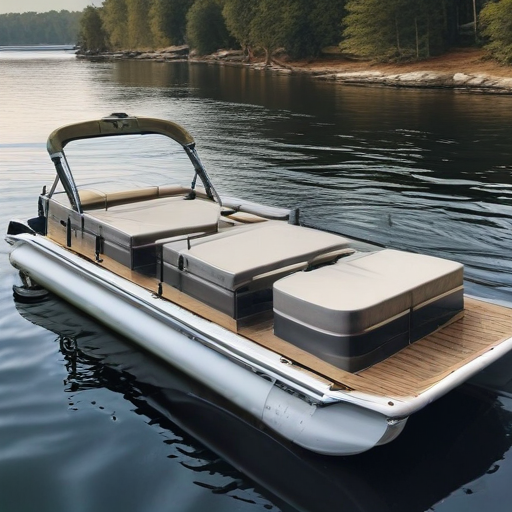
List Various Types of “pontoon boats for sale”
When shopping for pontoon boats, you’ll come across various types, each designed to meet different needs and preferences. Here’s a roundup of popular types:
1. Fishing Pontoons:
– Single-Deck Fishing Pontoons: Equipped with fishing rod holders, ample storage for tackle, and livewells to keep your catch fresh.
– Dual-Deck Fishing Pontoons: Offer upper platform options for better fishing vantage and extra space.
2. Luxury Pontoons:
– High Performance Pontoons: Enhanced with features like upgraded upholstery, advanced navigation systems, and powerful engines for a smooth ride.
– Luxury Entertainer Pontoons: Include gourmet kitchens, plush seating, and sometimes even bars, designed for hosting gatherings.
3. Sport Pontoons:
– Water Sports Pontoons: Built for activities like water skiing and wakeboarding, with powerful engines and specialized tow points.
– Hybrid Sport Pontoons: Combine features for both relaxation and recreation—like swim platforms and sports gear storage.
4. Utility Pontoons:
– Basic Utility Pontoons: Simple and functional, ideal for casual cruising or use as a work platform, with minimal frills but maximum utility.
– Hardtop Utility Pontoons: Offer shade and protection from the elements with a hardtop canopy.
5. Compact Pontoons:
– Mini Pontoons: Smaller, more manageable – excellent for small lakes and ponds, and often more affordable.
– Compact Utility Pontoons: Versatile smaller boats that are easy to transport and ideal for a wide range of activities.
6. Party Pontoons:
– Party Barges: Designed specifically for social gatherings, they feature large deck spaces, multiple seating options, and sometimes even sound systems and wet bars.
7. Family-Friendly Pontoons:
– Kids-Friendly Models: With safety features, comfortable seating, and enough space to entertain kids.
Whether your needs revolve around leisure, sport, fishing, or family fun, there’s a pontoon boat tailored to enhance your time on the water.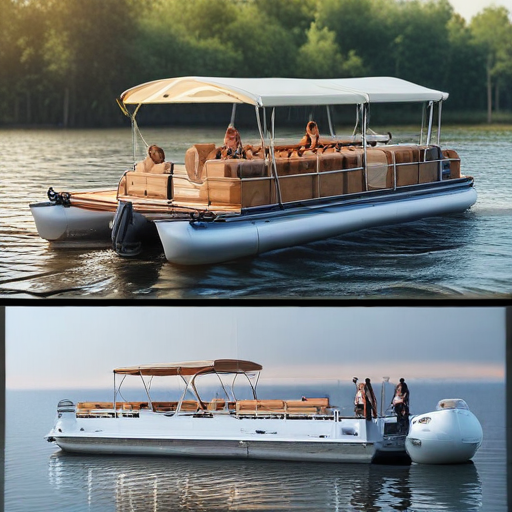
pontoon boats for sale Accessories Upgrades and Custom Manufacturing Options
Pontoon boats offer a versatile and customizable option for water enthusiasts. When looking for pontoon boats for sale, it’s essential to consider various accessories, upgrades, and custom manufacturing options to enhance your boating experience.
Accessories: Popular additions include Bimini tops for shade, advanced sound systems for entertainment, and LED lighting for nighttime activities. Fishing enthusiasts often opt for fishing rod holders, live wells, and trolling motors. Comfortable seating options, such as captain’s chairs or lounge seats, can drastically improve the overall experience.
Upgrades: Performance upgrades can include more powerful outboard motors for those who enjoy water sports or need higher speeds. Hydraulic steering systems offer smoother handling, while upgraded fuel systems can extend your time on the water. For tech-savvy boaters, adding GPS navigation systems, fish finders, and digital throttles can significantly expand functionality.
Custom Manufacturing Options: Customization allows buyers to tailor the boat to their specific needs. Custom floor plans can include everything from bars and mini-kitchens to extended deck spaces. Opt for durable and stylish flooring materials like marine-grade carpet or vinyl. Boat exteriors offer a range of colors and graphic designs for a personalized touch. Storage solutions can also be customized, including under-seat storage or built-in coolers.
Conclusion: Investing in the right accessories, upgrades, and custom manufacturing options can turn a regular pontoon boat into a luxurious, multi-functional watercraft tailored to your needs and preferences. Whether you enjoy leisurely cruises, high-speed water sports, or fishing, there is a pontoon customization option that can meet your requirements. Make sure to explore all available options to get the most out of your pontoon boat purchase.
List Quality Control and The Manufacturing Process of “pontoon boats for sale”
Quality Control
Materials Inspection: Ensure that raw materials such as aluminum, fiberglass, and marine-grade plywood meet specified standards for durability and corrosion resistance.
Fabrication Accuracy: Utilize precision equipment to cut and form aluminum to exact design specifications. Regular calibration of machinery is essential.
Welding Checks: Inspect all welds for integrity and strength. Non-destructive testing methods, such as ultrasonic testing, can be employed.
Floatation Testing: Verify the airtightness and buoyancy of pontoons by submerging them in water and checking for leaks.
Component Fitment: Ensure all parts (e.g., seating, railings, and controls) fit seamlessly and securely. Test mechanical and electrical systems for proper operation.
Final Inspection: Conduct thorough visual and functional inspections before shipment. This includes checking for cosmetic flaws, operational readiness, and safety compliance.
Manufacturing Process
Design & Planning: Engineers create detailed plans using CAD software. This includes specifications for materials, dimensions, and assembly procedures.
Material Sourcing: High-quality materials, like marine-grade aluminum and treated plywood, are purchased from reputable suppliers.
Cutting & Shaping: CNC machines cut and shape the aluminum sheets according to design specifications. Wood is also cut and treated for durability.
Welding: Skilled welders assemble hull sections and attach them to the pontoons. High-quality welding ensures structural integrity and longevity.
Assembly: The deck is installed onto the pontoons, followed by the placement of seating, railings, and other components. Electrical systems are wired, and mechanical parts are mounted.
Finishing: Surfaces are painted or coated to enhance durability and aesthetic appeal. Upholstery and other comfort features are added.
Quality Control: Multiple quality checks are conducted at different stages to ensure compliance with safety and performance standards.
Testing: The fully assembled boat undergoes water testing to assess buoyancy, stability, and operational functionality.
By ensuring rigorous quality control and following a meticulous manufacturing process, pontoon boat manufacturers can produce high-quality, reliable boats for sale.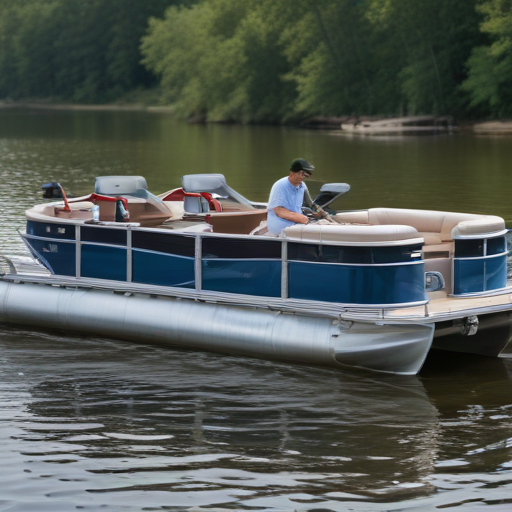
How to use “pontoon boats for sale”
If you’re on the lookout for pontoon boats for sale, there are several effective steps you can follow to ensure you find the perfect vessel for your needs:
1. Online Listings: Start by browsing online marketplaces like Craigslist, BoatTrader, and local classified websites. These platforms offer a wide variety of pontoon boats for sale, complete with photos, specifications, and pricing details.
2. Dealerships: Visit local marine dealerships that specialize in pontoons. Dealerships often have both new and used boats, and sales staff can offer valuable advice on what might meet your requirements.
3. Social Media: Utilize social media platforms like Facebook Marketplace and boating groups. These can be great places to find pontoon boats for sale and connect directly with individual sellers.
4. Boat Shows: Attend boat shows where multiple dealers showcase their inventory. Boat shows often offer special deals and the chance to compare many boats in one location.
5. Local Ads: Check local newspapers and community bulletin boards for ads. Sometimes sellers who prefer traditional methods of advertising list their boats here.
6. Inspection and Test Drive: Before purchasing, always inspect the boat in person and request a test drive. Look for signs of wear and ensure that the engine, electrical system, and other crucial components are in good condition.
7. Price Comparison: Compare prices across different platforms and sellers to ensure you’re getting a fair deal. Take note of any additional costs, such as taxes, registration, and maintenance.
By following these steps, you can navigate the market efficiently and find the best pontoon boats for sale that suit your preferences and budget.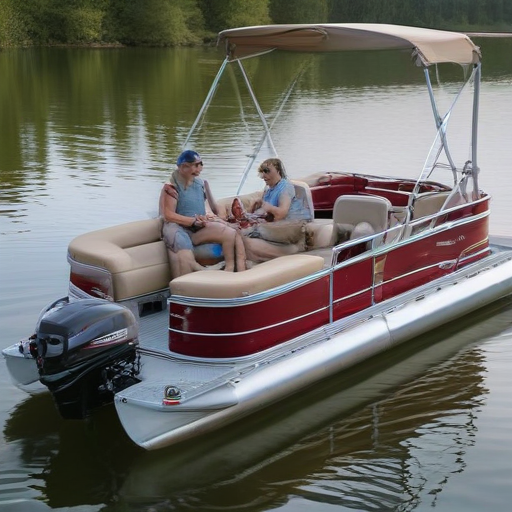
“pontoon boats for sale” Comparative Analysis
When considering buying a pontoon boat, several factors come into play, such as price, features, quality, and brand reputation. Here’s a comparative analysis of some popular pontoon boat brands that are frequently sought after by buyers:
1. Bennington
Price Range: Mid to High-End
Features:
– High-quality materials and luxurious finishes.
– Excellent customization options.
– Top-notch comfort and performance.
Pros:
– Renowned for durability and innovative design.
– High resale value.
– Superior customer service.
Cons:
– More expensive than many competitors.
– Premium models can get pricey.
2. Sun Tracker
Price Range: Affordable to Mid-Range
Features:
– Family-friendly design with practical amenities.
– Good range of sizes suitable for fishing, leisure, and cruising.
Pros:
– Great value for money.
– Wide dealer network for accessibility.
– Reliable performance and safety.
Cons:
– Less luxurious than high-end brands.
– Fewer customization options.
3. Harris
Price Range: Mid to High-End
Features:
– Modern designs with a focus on comfort.
– Advanced marine technology and engineering.
Pros:
– Strong reputation for quality and durability.
– Excellent performance on the water.
– Good customer service.
Cons:
– Can be pricey for high-end models.
– Slightly fewer standard features compared to competitors at base models.
4. Lowe
Price Range: Affordable to Mid-Range
Features:
– Practical designs ideal for fishing and family outings.
– Known for sturdy construction.
Pros:
– Competitive pricing.
– Reliable and durable build.
– Long-standing brand reputation.
Cons:
– Less luxurious than some rivals.
– Limited high-end options.
Conclusion:
For luxury and long-term value, Bennington and Harris are top choices despite the higher initial investment. Sun Tracker offers excellent value, especially for families, while Lowe is ideal for those seeking durability without breaking the bank. Your ideal boat will vary based on your specific needs and budget, so consider test driving a few models to find the best fit for you.
“pontoon boats for sale” Warranty and Support
When investing in a pontoon boat, the warranty and support offered by the manufacturer or dealer are crucial factors to consider. Here’s a brief overview of what to look for regarding warranty and support:
Warranty
1. Coverage: Understand the breadth of coverage, including the hull, structural components, engine, and related accessories. A comprehensive warranty ensures peace of mind by covering critical areas.
2. Duration: Warranties can range from one year to a lifetime for certain parts. Opt for longer durations as they typically indicate confidence in the product’s durability.
3. Transferability: A transferable warranty can enhance your boat’s resale value. Verify if the warranty can be transferred to a new owner should you decide to sell the boat.
4. Limitations and Exclusions: Be aware of any exclusions, such as damage from normal wear and tear, misuse, or neglect. Understanding these details helps set realistic expectations.
Support
1. Customer Service: Quality customer service is key to a smooth ownership experience. Look for dealers known for responsive and helpful support channels, whether through phone, email, or in-person visits.
2. Dealership Network: A wide network of authorized dealerships ensures easier access to repairs and maintenance services. This can be particularly beneficial if you use your boat in different regions.
3. Technical Assistance: Access to technical support can be a lifesaver. This might include troubleshooting help, maintenance tips, and advice on optimizing boat performance.
4. Community and Resources: Often overlooked, a strong user community and access to online resources like forums, how-to videos, and detailed manuals can provide added support and troubleshooting help.
By prioritizing robust warranty coverage and excellent support services, you can ensure a more confident and enjoyable pontoon boat ownership experience. Always read the fine print and don’t hesitate to ask the dealer specific questions to fully understand the terms and benefits.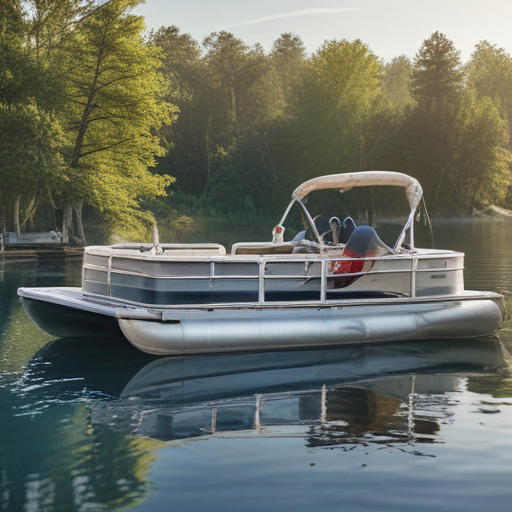
List “pontoon boats for sale” FAQ
Pontoon Boats for Sale FAQ
1. What is a pontoon boat?
A pontoon boat is a flat-bottomed boat that floats using pontoons (also called tubes). These are ideal for leisure activities such as fishing, swimming, and cruising.
2. What should I consider when buying a pontoon boat?
Consider size, passenger capacity, intended use (e.g., fishing, partying), engine power, and additional features like seating arrangements, storage options, and onboard amenities.
3. How much does a new pontoon boat cost?
Prices can range from $15,000 to over $100,000 depending on size, brand, and features. Used boats can be significantly cheaper.
4. Can I finance a pontoon boat?
Yes, many dealers and financial institutions offer financing options for pontoon boats. Terms and interest rates will vary based on credit score and loan amount.
5. Is it better to buy new or used?
New boats come with warranties and the latest features but are more expensive. Used boats are cheaper but might need more maintenance. Inspect used boats carefully before purchasing.
6. What maintenance does a pontoon boat need?
Routine maintenance includes cleaning, checking the engine and electrical systems, and inspecting the pontoon tubes for leaks or damage. Winterizing is essential in colder climates.
7. How do I transport a pontoon boat?
You’ll need a trailer designed for pontoon boats and a vehicle capable of towing the weight. Make sure to verify the towing capacity of your vehicle.
8. Are there any safety considerations?
Ensure the boat is equipped with life jackets, navigation lights, a first aid kit, fire extinguishers, and signaling devices. Follow local boating regulations and guidelines.
9. Where can I buy a pontoon boat?
Pontoon boats can be purchased from marine dealers, boat shows, private sellers, and online marketplaces. Visiting a dealer allows for test drives and professional advice.
10. Can I add custom features or accessories to my pontoon boat?
Yes, many pontoon boats can be customized with additional seating, entertainment systems, fishing gear, and other amenities depending on the brand and model.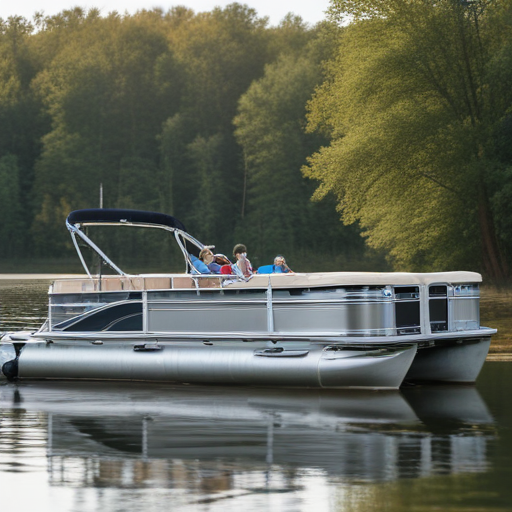
Top 10 FAQ with answer about pontoon boats for sale for Buyer Sourcing from China
Sure, here’s a concise list of the top 10 frequently asked questions with answers about sourcing pontoon boats for sale from China:
1. Q: Are Chinese-made pontoon boats of good quality?
A: Yes, many Chinese manufacturers adhere to international standards and use quality materials, but it’s essential to conduct thorough research and request product certifications.
2. Q: What is the average cost of a pontoon boat from China?
A: Prices can vary widely based on size, features, and customization but typically range from $10,000 to $50,000.
3. Q: Can I customize the design and features of the pontoon boat?
A: Yes, most Chinese manufacturers offer customization options to meet specific buyer requirements, including layout, seating, and additional features.
4. Q: How long does it take to manufacture and ship a pontoon boat from China?
A: The production time can range from 30-90 days depending on customization and order size, with shipping taking an additional 20-30 days.
5. Q: What about warranty and after-sales service?
A: Reputable manufacturers usually provide warranties ranging from 1 to 3 years. After-sales service can include parts replacement and technical support.
6. Q: How do I ensure the manufacturer is reliable?
A: Verify credentials through trade references, visit the factory if possible, and request third-party inspection reports.
7. Q: What are the shipping costs and responsibilities?
A: Shipping costs depend on the destination, boat size, and shipping method. Incoterms (FOB, CIF, etc.) clarify responsibilities and costs between buyer and seller.
8. Q: Are there any import duties or taxes?
A: Yes, import duties and taxes vary by country. Check with local customs authorities for specific rates applicable to pontoon boats.
9. Q: What payment terms do Chinese manufacturers typically accept?
A: Common terms include T/T (Telegraphic Transfer) with a deposit (30-50%) before production and the balance upon shipment or L/C (Letter of Credit).
10. Q: Can I get a sample before placing a bulk order?
A: While full pontoon boat samples are impractical, manufacturers often allow inspections of previous builds or scaled models. Larger orders might include visits to ongoing builds.
By addressing these FAQs, potential buyers can make informed decisions when sourcing pontoon boats from China.
